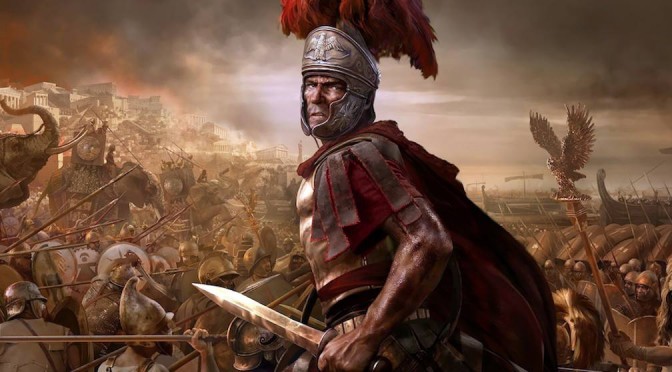Much of the history of Rome appears to be well documented, doubts only arise when the sources of the data are critically examined. The following summary of Roman history is given so that it may provide a yardstick for other considerations. It does not mean that this brief history is complete or even correct. It is just a deliberately brief summary of current historical opinion.
Roman Kings
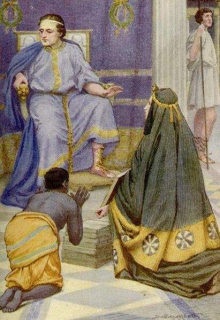 Originally the Roman state was governed by Kings. The succession was never entirely hereditary but membership of the family of a previous king gave prominence to the claims of some candidates. In 510 BC a shift occurred from a kingdom to a republic. The regal powers were shared by two consuls who only ruled for a single year and had had to receive the approval of the senate for every action they took. Thus the kings and their successors, did not own, but rather served the nation.
Originally the Roman state was governed by Kings. The succession was never entirely hereditary but membership of the family of a previous king gave prominence to the claims of some candidates. In 510 BC a shift occurred from a kingdom to a republic. The regal powers were shared by two consuls who only ruled for a single year and had had to receive the approval of the senate for every action they took. Thus the kings and their successors, did not own, but rather served the nation.
This is in itself a rather Celtic arrangement, not something ever considered by the Romans.
Constitution
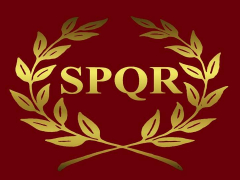 Fig 1 The Constitution. "For the Senate and People of Rome"There was a fundamental flaw in the constitution of the Roman Empire. It did not have one! The “constitution” was based on precedent, largely unwritten. It is not perhaps surprising. The purpose of the Roman State was to create wealth for sixty families, known as “Patricians.”
Fig 1 The Constitution. "For the Senate and People of Rome"There was a fundamental flaw in the constitution of the Roman Empire. It did not have one! The “constitution” was based on precedent, largely unwritten. It is not perhaps surprising. The purpose of the Roman State was to create wealth for sixty families, known as “Patricians.”
The Senate
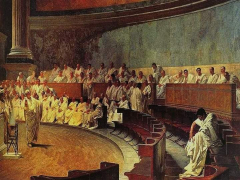 Fig 2 The SenateThe wealth of the Roman state was distributed amongst individuals from these families in proportion to the responsiblity each individual accepted for governance. Not only did Rome have no constitution but an imprecise legal structure. Judgements were made which were not based on written law or precedents. Each case was judged on it’s merits and the only predictable outcome was the decision was always to the advantage of the Patricians.
Fig 2 The SenateThe wealth of the Roman state was distributed amongst individuals from these families in proportion to the responsiblity each individual accepted for governance. Not only did Rome have no constitution but an imprecise legal structure. Judgements were made which were not based on written law or precedents. Each case was judged on it’s merits and the only predictable outcome was the decision was always to the advantage of the Patricians.
Expansion
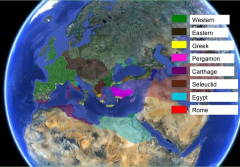 Such a society was inevitably reactive in its initiatives.As Rome started to expand the Senate was aware that good quality arable land, gold, silver, precious jewels, silk, and spices all lay beyond the territory they controlled. Initially Rome made use of the Greek trading colonies which had proliferated along the northern shore line of the Mediterranean. However the the Romans regarded trading as a a disreputable activity. To them an occupation which bought a commodity at one price and sold at a highly inflated price without doing anything to enhance the commodity must be tainted with corruption. It was perhaps this attitude which enabled Rome to treat these early Grecian trading partners so shamefully and to always discriminate agains trading nations.
Such a society was inevitably reactive in its initiatives.As Rome started to expand the Senate was aware that good quality arable land, gold, silver, precious jewels, silk, and spices all lay beyond the territory they controlled. Initially Rome made use of the Greek trading colonies which had proliferated along the northern shore line of the Mediterranean. However the the Romans regarded trading as a a disreputable activity. To them an occupation which bought a commodity at one price and sold at a highly inflated price without doing anything to enhance the commodity must be tainted with corruption. It was perhaps this attitude which enabled Rome to treat these early Grecian trading partners so shamefully and to always discriminate agains trading nations.
Magna Graecia
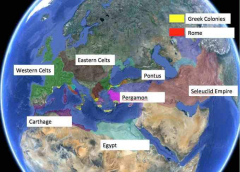 In the early days of the Republic, south western parts of the Italian peninsula were dominated by Grecian colonies. The whole area was known as Magna Graecia, Greater Greece.
In the early days of the Republic, south western parts of the Italian peninsula were dominated by Grecian colonies. The whole area was known as Magna Graecia, Greater Greece.
Rome expansion took the form of demanding unreasonable terms of trade and then making threats to invade it’s neighbours.
By the time of Alexander the Great (325 BC) Rome had fought with and/or entered alliances with Latin, Etruscan and Greek cities on the western coast of the Italian peninsula. In the following fifty years those alliances had been extended to all the Italic, and Greek cities below the Po Valley.
However in the midst of their expansion they had tasted defeat by the Celtic tribes who lived to the south of the Alps, a defeat which had a long term effect on Roman thinking.
Pyrrhus
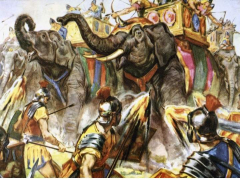 Fig 4 Pyrric Victories.Tarentum, one of the Grecian city states in the far south east appealed to Pyrrhus of Epirus for assistance. Pyrrhus, a second cousin of Alexander the Great, remained in Italy and Sicily for five years and was never beaten by the Romans..
Fig 4 Pyrric Victories.Tarentum, one of the Grecian city states in the far south east appealed to Pyrrhus of Epirus for assistance. Pyrrhus, a second cousin of Alexander the Great, remained in Italy and Sicily for five years and was never beaten by the Romans..
Pyrrus’ comment when he first confronted a Roman army was “ But this is not a barbarian army” amazed at how adept the Romans were in the use of complex strategies and battlefield tactics.The comment reveals that at this point in time Greeks had a relatively low opinion of Rome.
At the same time there was a low key power struggle in the Eastern Mediterranean between Carthage and Egypt. Egypt was more concerned with the conflict with the Sassonid empire of Persia and therefore avoided armed conflict with Carthage. They encouraged Rome to challenge Carthage and were not disappointed.
There is no evidence that the Romans ever hated the Celts in the same way they hated the Carthaginians.
According to the Aeneid the hatred between Rome and Carthage was ordained by the gods. Aneaus, during his adventures, seduced and won the heart of Queen Dido of Carthage, but then abandoned her to seek his destiny in Italy.
Certainly Rome saw Carthage as a threat.
War in Sicily
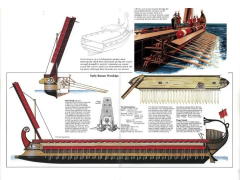 Fig 5 The Corvus The subsequent chain of events, not detailed preplanning, created the Roman Empire. Pyrrhus left Italy to claim the throne of Macedon and left a power vacuum in Sicily. A group of mercenaries sized the Grecian city of Messina. The neighbouring city of Syracuse, also Grecian, tried to expel them. Rome and Carthage both tried to take advantage of the situation.
Fig 5 The Corvus The subsequent chain of events, not detailed preplanning, created the Roman Empire. Pyrrhus left Italy to claim the throne of Macedon and left a power vacuum in Sicily. A group of mercenaries sized the Grecian city of Messina. The neighbouring city of Syracuse, also Grecian, tried to expel them. Rome and Carthage both tried to take advantage of the situation.
It lead to a war for the possession of Sicily in 241 BC. which Rome won.
Thought the Romans won a great naval victory and the control of Sicily the war had virtually no effect on the Carthaginian control of the North African seaboard.
Egypt then used it’s influence to persuade Massalia at the mouth of the Rhone (Modern Marseilles) to declare itself an ally of Rome. Rome accepted them as such. Messalia however had links with other colonies on the shores of Hispania, Empurion and Saguntum. Wishing to secure Massalia’s good will Rome accepted and negotiated a treaty with Carthage that in Hispania Rome would not take any interests south of the Ebro river and in return Carthage promised not to take any interests north of the Ebro. The Ebro river still today separates Catalonia from the rest of the Iberian peninsula
The Carthaginian Treaty
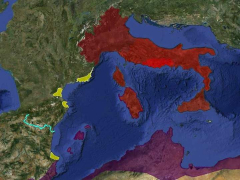 The treaty looked attractive to Carthage as it apparently confirmed that their Hispanic empire was recognised by Rome.
The treaty looked attractive to Carthage as it apparently confirmed that their Hispanic empire was recognised by Rome.
However Rome only entered into the treaty to prevent an alliance between Carthage and the Celtic tribes of Cisalpine Gaul resulting in a co-ordinated attack on Italy. In 225 such an attack was made but the Carthaginian contribution was limited. On this occasion, Rome won a significant victory over the Gauls and by a combination of alliances and conquest extended its frontier northwards to the Alps.
The Carthaginian treaty was unusual because at that time Rome did not control Catalonia, the land north of the Ebro and it is debatable whether Carthage itself had any control over what happened in Hispania.
The Carthaginian colony in Southern Hispania was a “private” initiative by the Barca family, who gained control of the rich Silver mines of Rio Tinto and Carthago Novas. It made them very rich and the Barcas had a deep mistrust for Rome.
Saguntum was significantly south of the Ebro but because of its links with Massalia declared itself to be an ally of Rome. Hannibal Barco immediately laid seige to Saguntum. Rome’s senate declared this to be a criminal act and demanded that Hannibal be handed over for “Roman Justice”.
Hannibal
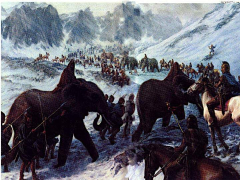 Fig 8 HannibalThe year was BC 218 Hannibal’s reply was to march north across the Ebro and by the end of the year cross the Alps into Cisalpine Gaul and on into Italy. Thanks to their alliance with Messalia, Rome knew they were coming but in a repeat of their dealings with Pyrrus pursued a policy of containment.
Fig 8 HannibalThe year was BC 218 Hannibal’s reply was to march north across the Ebro and by the end of the year cross the Alps into Cisalpine Gaul and on into Italy. Thanks to their alliance with Messalia, Rome knew they were coming but in a repeat of their dealings with Pyrrus pursued a policy of containment.
Hannibal remained in Italy for fifteen years, achieving several substantial victories over the Roman army and never suffering a single defeat. Whilst Hannibal was in Italy ravaging the coutryside but unable to take Rome itself, the senate sent its ex-consuls for years BC 222 and 221 (The Scipio brothers Publius and Gnaeus) to attack the Carthagenians (Barca’s) in Spain. Undoubtably the attraction was the silver mines.
This then triggered a new chain of events.
Demetrius
Demetrius of Pharos, the puppet king of coastal Illyria (modern Croatia) perceived the roman preoccupation with the Carthaginians and Hispanic as an opportunity to shake off Roman influence. Again Rome sent its Consul ( Lucius Aemelius Paullus) against Demetrius leaving Hannibal free to roam Italy.
It is significant that it was in the middle of this conflict Egypt chose to finally throw all it’s resources against Persia. At the battle of Raphia, Egypt had a significant victory but the Persians soon returned. Later Egypt manipulated events even further to make Rome look further afield and thereby become a permanent distraction for the Persians.
Macedonia
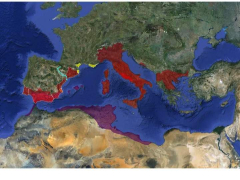 Fig 11 Victory in HispaniaDemetrius fled to Macedon. but in BC 216 returned, now as chief advisor of Philip of Macedon. Philip formalised an alliance with Carthage.
Fig 11 Victory in HispaniaDemetrius fled to Macedon. but in BC 216 returned, now as chief advisor of Philip of Macedon. Philip formalised an alliance with Carthage.
In 211 Rome entered into a treaty with Greece ( Aetolian league) against Macedon, the Aetolian’s then mobilised Pergamon (todays Western Turkey in Asia) against Macedon. In turn Bithnia ( today’s North Eastern Turkey in Asia) threatened Pergamon.
Suddenly Rome was involved in wars stretching from the Atlantic ocean to the Black Sea and they still had to contain Hannibal who continued to ravage the Italian peninsula.
Hispania
The senate continued to give priority to Hispana, In BC 211, both the Scipio brothers were killed there at the battle of upper Baetis. At the end of the battle in which both of their commanders had been killed, the Roman Legions elected their next commander in the field. The fact that the Senate allowed this to happen without any retribution, set a precedent which was to be repeated many times, sometimes with disruptive results.
In 206 an army commanded by the son of the elder Scipio brother (Scipio Africanus) finally defeated the Carthagenians and expelled them from south eastern Hispania. Importantly, the lands they made secure included to two biggest silver mines known to the ancient world, at Carthago Nova and Rio Tinto.
The land Rome now controlled in Hispania was inhabited by Iberian peoples. The rest of the Hispanic Peninsula was occupied by a large number of Celtic ( Gallic?) tribes.
